Confidence
How a Cancelled Wedding Turned Me Into a War Reporter
I discovered my authentic self when I left my comfort zone for a war zone.
Posted October 15, 2021 Reviewed by Davia Sills
Key points
- When we leave our comfort zones, we experience new situations, which can help us build life skills like courage, resilience, and self-reliance.
- Taking risks gives us space to discover new passions and interests and become more creative problem-solvers.
- Progress in life isn’t a straight line, and struggling through challenging experiences can put us on the path to success.
The worst day of my life was the best thing that ever happened to me.
I stepped into my white dress three days before my wedding and imagined the beautiful picture I would place on my mantle. In my mind, marriage got me something I didn’t have. A position. A place in the world. I couldn’t wait to show it off.
“The dress looks perfect!” the tailor said.
On paper, my guy had everything: an ivy league education, stock options, and parents with a pied-a-terre in Manhattan. In real life, Eric was lost, unsure of who he was and what he wanted.
I was no different.
After the fitting, I returned to our apartment, and Eric told me, “I can’t do it,” as if he were canceling dinner and a movie.
The rejection stung like a million killer bees. I burst with rage. Not at Eric, but at me, for feeling like I couldn’t do any better than a fiancé who wanted to marry someone with status and pedigree. I only had personality.
I was adrift, searching for an identity beyond jilted bride.
Lost and found
The great thing about hitting rock bottom is there is only one place to go. Up.
I had wanted to be a war reporter, but I didn’t believe in myself. My canceled wedding changed that as inner strength replaced my insecurities. If I could return already opened wedding gifts to Crate and Barrel during what would have been my honeymoon, I could handle a work rejection.
But I was a segment producer for CNN business news, not an international correspondent.
One woman held the key to a foreign assignment, and she had no idea who I was. For eight months, I tried to get her on the phone.
Finally, I waited on hold for four hours until she picked up. “I know you’ve been trying to reach me,” she said. “I have five minutes.”
“I am a CNN producer in New York. I can shoot video and edit,” I said. “I’ll save you money because I travel alone. I’ll be in Atlanta soon. Pick a day to meet.”
I suddenly had what my grandma called chutzpah. I had no plans to be in Atlanta and couldn’t afford the $300 plane ticket.
“August 12th at 10:30 a.m.,” she said.
Months later, she sent me to Iraq, and after that, to Afghanistan.
Turning into a war reporter gave me a chance to become the hero of my own story.
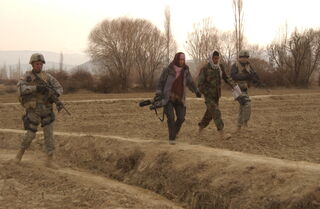
A (big) dose of discomfort
Getting to Afghanistan wasn’t easy. There was no direct flight from JFK to Kabul.
I flew British Air to Dubai, and in the Afghan Airways terminal, men in beige robes stood over opened suitcases, trading items to avoid excess baggage fees. Live chickens waddled around.
When I arrived in Kabul, I wore my headscarf and waited for my bags that never came. I found a guy who found a guy who found a guy who spoke English.
“Where are my bags?” I asked.
“Maybe they’ll show up later this week,” he said.
Outside, I found my transportation: an up-armored army Humvee with bulletproof windows and a soldier standing in a turret, with a .50 caliber rotating machine gun, ready to shoot any vehicle that got too close.
Just as I was grabbing my flak jacket, my boss called on the satellite phone.
“What’s your status?” he asked. “We’d like a story for Wolf Blitzer’s show.”
I’d been traveling for 30 hours. I was wearing dirty underwear and had no gear. The story would wait. My stuff arrived two days later.
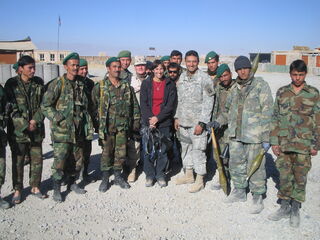
I spent a month in Afghanistan. I traveled in helicopters and in mud-splattered Humvees. Each morning, I looked at my legs and prayed they would be attached to my body at the end of the day.
In a place where there was no comfort, I transformed. I learned not to fear being afraid. To accept that terrible things can happen. Not to sweat the small stuff. To inhale gratitude and never give up.
I felt anything but fragile and forgot all about my wedding that wasn’t.
Get uncomfortable and grow
Over the next decade, I traveled to Iraq, Sudan, Kosovo, Israel, and the Gaza Strip. In each location, I met soldiers and civilians who changed my perspective and shaped my journey.
I discovered a stronger, more resilient, and authentic me. I liked her.
I grew and changed, but progress isn’t linear, and I made some big mistakes. Like when I married a fighter pilot I met on an aircraft carrier in the Persian Gulf. One day I’ll write a book about it called What The F*ck Was I Thinking?
But those experiences led me here, 15 years later: to finding true love with a guy who really gets me, and becoming a former war reporter, whom a 9-year-old boy calls mom.
Comfortable but not content
As I became a wife and mother, I morphed into what my family needed and lost myself. I was my son’s playmate, teacher, and therapist, and my husband’s cook, travel agent, and barista.
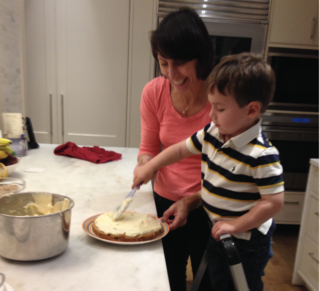
In my stable home, I felt caged. Like I needed to break free and shake things up.
I craved something else.
I considered my options. Run off? No. Break down? No. Find me (again)? Yes.
Looking for reasonable risks
I gave up my teaching job at New York University when COVID turned the world upside down, and I tried to write a novel. It was a bust.
I went back to reporting and submitted a story on early childhood education to dozens of publications. I didn’t get a nibble.
But in the process of trying new things, I rediscovered my mojo. The outcomes weren’t what I wanted, but I felt alive in the moment.
I turned to Arabic as an option to give me more momentum. I had studied it in graduate school and loved how speaking it transports me to a faraway land.
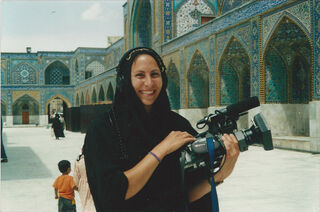
I found a Palestinian tutor in Amman through an online language site. In the beginning, we focused on grammar.
When the conflict between the Israelis and Palestinians blew up last May, I wanted to talk about it, but I felt nervous. I didn’t want to impose. Should I bring it up?
I took the chance.
شو رايك في الاخب من اسرايل؟
“What do you think about the news from Israel?” I asked in Arabic.
“It’s terrible,” she said. “But I’m tired of listening to the Palestinian arguments. I teach students in Israel, and they suffer too.”
I jumped in: “That’s how I feel about the Israeli side. I’m Jewish, but my heart aches for Palestinians too,” I said.
We have a genuine friendship. I plan to attend her wedding next year.
Taking emotional risk
Being a journalist has always been a sacred space for me. I’ve loved telling other people’s stories, but I’ve never had the guts to reveal my own. So, I started this blog. Maybe my story resonates.
Every time I push submit and send a story into the world, my heart races. That’s where I reconnect to my inner war reporter. I don’t have to be in Baghdad to feel brave.
I recently met with an agent about writing a proposal for a book on risk-taking.
“I love the idea,” she said.
I’ve never written anything longer than 2,000 words. I’m not sure I can do it but I know I have to take the chance.
Will I be successful? I’m not sure what success means. I don’t think it’s a specific outcome or a place. For me, it’s becoming my bravest and most authentic self. Getting uncomfortable puts me on that path.
I signed the contract with my agent and wrote, “I’m so excited! Let’s do this!”
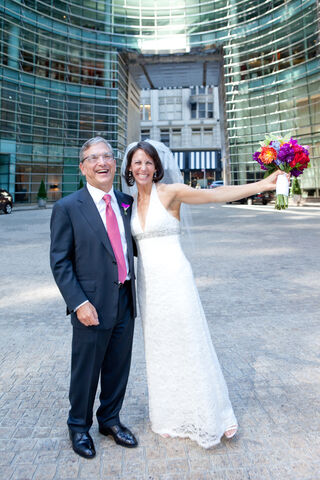
Sum it up
Everyday risks are opportunities to build new life skills. Positive psychology coach and best-selling author Carol Adams Miller said staying too comfortable doesn’t help us grow. “We’re all looking for ways to elevate our self-confidence. The only way is by going out of your comfort zone.”
3 reasons to take reasonable risks
1. You become a better problem-solver.
When you step out of what’s comfortable and familiar, your brain formulates creative ideas and new ways to solve problems.
2. You gain self-confidence.
When you test yourself, you master new skills that can boost your confidence. Self-confidence is associated with less stress and anxiety.
3. You create new opportunities.
After you take a risk, you won’t ask yourself, “What if?” You’ll end up with valuable experience and knowledge, even if you fail. This can lead to greater success in the future.




